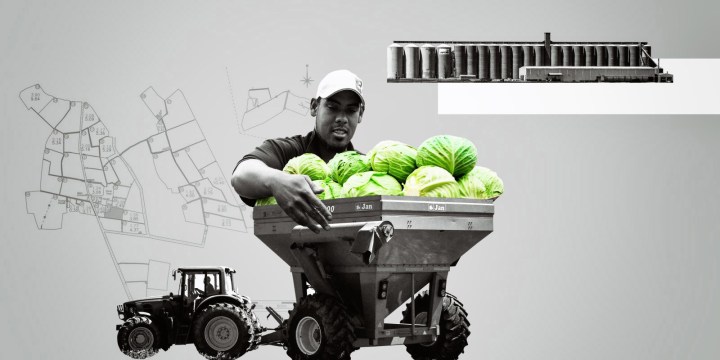AGRIBUSINESS
South Africa’s small-scale farmers have a hard row to hoe, especially in the absence of policy support

In a dialogue about African agriculture industry insiders highlighted some of the challenges farmers face – including the misalignment of government policy with the needs of agribusiness.
The misalignment of the government’s agriculture policy with farmers and agribusiness is detrimental to farmers’ growth and development – particularly small-scale farmers, experts and practitioners in the field warned during a dialogue held at the Gordon Institute of Business Science on Tuesday, 22 August.
The dialogue took place against the backdrop of the BRICS Summit, which also kicked off on Tuesday. Economist and research fellow Francois Fouché questioned the benefit South African farmers derive from the BRICS bloc of nations.
“Today we start the BRICS Summit here in Johannesburg, and on the agenda is an expanded BRICS, but yet within the five members we cannot access agricultural exports to the massive economy in China; we have access to a handful of products and the last one took nine years to negotiate,” he said.
South Africa has a robust agricultural export market, particularly of maize, wine, grapes, citrus, nuts, avocados, wool and several other crops. In 2022, agricultural export earnings reached a new record of $12.8-billion – a 4% increase from the previous year, thanks to an uptick in global commodity prices.
There’s an inconsistency around policy, labelling and then trying to farm for the future.
The industry gains, however, are mainly concentrated among large-scale farmers, and also occur in the context of local policy that doesn’t support a level playing field between small- and large-scale farmers.
Mbali Nwoko, multi-award-winning farmer, entrepreneur, speaker, columnist and podcaster, who was on the panel, highlighted the struggle of growing as a farmer while also having to consider the planet, people and profit alongside policy that doesn’t support their development.
“Another big issue we’re not having conversations about is sustainability versus food standard and compliance. The standards are up in the air,” Nwoko said. “In terms of what’s available on the market to use on my peppers, it’s not approved from a global gap standard. And to get a product approved in the market, [it] has to be approved by the Department of Agriculture, Land Reform and Rural Development [DALRRD], which can take years. There’s an inconsistency around policy, labelling and then trying to farm for the future.”
Read more in Daily Maverick: UN representative calls on SA to move beyond harmful apartheid pesticide laws
The panel highlighted that policy was indeed lagging behind, and that waiting for the government to pivot policy towards farmer development was going to further delay development. One of the solutions brought to the table by Dr Mandla Mpofu, MD at Omnia Agriculture, was innovation. Once this was in place, policy would follow, he said.
“South Africa and Africa do have problems, but we have the solutions as well… from a manufacturing point of view, we are moving away from conventional ammonia production, for example, to green ammonia, which is a big change. It will cost a bit at the beginning but in the long run it will become profitable,” Mpofu said.
“There’s an array of tools that are readily available, have been implemented, tested; there’s data that goes back decades that ensures that it actually works. The issue now is how do we make this accessible to all – and that’s where we are – not only to commercial farmers but to small-scale farmers as well.”
If we are really serious about turning the economic fortunes of this country around, we will have to shift the focus of our entire budget towards the future.
The Agriculture and Agro-Processing Master Plan, launched in 2022 by Minister of Agriculture, Land Reform and Rural Development Thoko Didiza, is meant to bridge some of the gaps, the panellists stressed. However, challenges to implementing the plan, such as financing, ongoing rolling blackouts and an ailing economy, have also played a role in slowing a growth plan that would aid development in the sector.
Read more in Daily Maverick: Finance is key to South Africa’s inclusive agricultural growth agenda
Christo van der Rheede, CEO at AgriSA, raised the issue of the DALRRD budget and how this trickles down to small-scale farmers.
“R17-billion is the budget for agriculture, 70% to 80% of that goes to salaries. What eventually lands up in the pockets of small-scale farmers – or farmers that do not have the ability to access finance because they simply don’t have collateral – is less than R1-billion. You tell me how far you are going to get with less than R1-billion,” Van der Rheede said.
“That’s our big problem; finance. If we are really serious about turning the economic fortunes of this country around, we will have to shift the focus of our entire budget towards the future.”
Panellists highlighted how farmers were organising themselves in light of limited policy and financial support. However, some challenges in the industry went way beyond what farmers themselves could tackle. These included competing at a global level with farmers from countries that have the finances to support their growers through subsidies.
Said Fouché: “If we don’t have deep pockets and the fiscal heft to subsidise our industry; what do we have left; what do we need to do? It’s very clear that we need to focus on efficiency and production by creating an enabling environment for agricultural produce in South Africa. That means making it as easy as possible to produce agricultural goods in South Africa.” DM



















 Become an Insider
Become an Insider
Comments - Please login in order to comment.